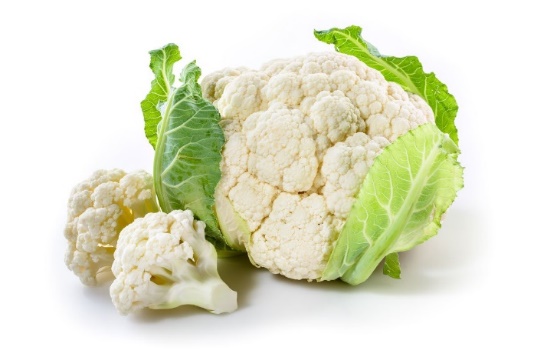Cauliflower: health benefits and hazards

Cauliflower is considered one of the most useful plant from Cruciferae family, together with broccoli, white cabbage and Brussels sprout, for a good reason. Many researches show that cruciferous vegetables are a source of natural antioxidants, by virtue of high content of vitamins, carotenoids, fibre, soluble sugars, minerals and phenol compounds.
Benefit of cauliflower is in high content of substances, which have:
- anti-inflammatory
- anti-carcinogenic properties
- protect from cardiovascular system diseases
- improve brain function
- promote loss of extra weight
Thanks to low number of calories, it is possible to eat of cauliflower in various dishes.
Protection from inflammation
Cauliflower is rich in antioxidants and anti-inflammatory compounds, such as beta-carotene, caffeic acid etc. These substances promote reduction of oxidative stress, inflammatory reactions that promote development of chronic diseases.
100 grams of cauliflower contain approximately 77 % of recommended daily value of vitamin С, famous for its anti-inflammatory properties.
During researches of Cruciferae family, their anti-carcinogenic properties were revealed, reducing probability of breast cancer, as well as colon, hepatic, lung and gastric cancer. That is why they belong to products, most effective in preventing cancer.
Reduced risk of heart and brain diseases
Anti-inflammatory properties of cauliflower are explained by vitamins К, С, various antioxidants and polyunsaturated fatty acids, which protect vessels from formation of plaques, normalize arterial pressure and reduce levels of blood cholesterol. Thanks to this, risk of cardiovascular diseases, stroke, diabetes, as well as Alzheimer and Parkinson disease is reduced.
Digestion improvement
Cauliflower is rich in fibre, 100 grams of cooked product contain approximately 10% of daily norm, it improves digestive tract condition. Low number of calories, absence of fats, small content of carbohydrates and high content of fibre makes cauliflower a perfect product for those who want to reduce and control weight.
Influence on thyroid gland function
According to researches, persons with reduced function of thyroid gland and iodine deficiency are not recommended to consume large amounts of raw cruciferous vegetables.
Digestive disorders, including flatus
Some people may experience digestive disorders after eating raw cruciferous vegetables, including white cabbage, cauliflower and broccoli. The reason for this is high content of carbohydrates in these vegetables, which do not completely decompose in digestive tract and create discomfort in combination with large amounts of fibre and sulfur. Thermal treatment of these vegetables (boiling, stewing, frying) solves this problem.
Cruciferous vegetables contain compounds, called purines. Purines, transformed into uric acid can be deposited as urates, causing aggravation of symptoms in persons with urolithiasis and gout.
Attention!
If you have stones in kidneys or gout in your anamnesis, consult your doctors before eating large amounts of cauliflower. However, you can avoid negative consequences if you consume small amounts of this product




